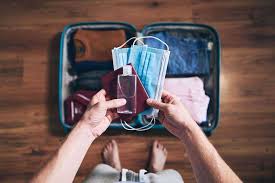Traveling abroad is an exciting adventure that broadens your horizons, exposes you to new cultures, and provides unforgettable experiences. However, it also comes with its own set of health risks. Different regions of the world have unique disease profiles, and travelers can be exposed to illnesses that may not be common in their home country. Therefore, disease prevention should be a priority to ensure a healthy and enjoyable trip. In this comprehensive guide, we’ll explore essential disease prevention tips for travelers to stay safe abroad.
Understanding the Risks
Before embarking on your journey, it’s crucial to understand the health risks associated with your destination. Research common diseases and health concerns in the area you plan to visit. This information can help you take appropriate precautions to protect yourself.
Common Travel-Related Diseases
- Malaria: A mosquito-borne illness prevalent in tropical and subtropical regions.
- Dengue Fever: Transmitted by Aedes mosquitoes, common in tropical and subtropical areas.
- Typhoid Fever: Caused by consuming contaminated food or water.
- Hepatitis A and B: Liver infections spread through contaminated food, water, or bodily fluids.
- Traveler’s Diarrhea: Caused by consuming contaminated food or water, leading to gastrointestinal issues.
Pre-Travel Preparation

Proper planning and preparation can significantly reduce your risk of contracting diseases while traveling. Here are some crucial steps to take before you depart:
1. Consult a Travel Health Specialist
Before traveling, schedule a consultation with a travel health specialist or visit a travel clinic. They can provide personalized advice based on your destination and health history. They will also recommend necessary vaccinations and medications.
2. Vaccinations
Ensure you are up-to-date on routine vaccinations, such as measles, mumps, rubella, and tetanus. Additionally, some destinations may require or recommend specific vaccines, including:
- Hepatitis A and B
- Typhoid Fever
- Yellow Fever
- Rabies (for certain high-risk areas)
- Japanese Encephalitis (for some Asian countries)
3. Travel Insurance
Purchase comprehensive travel insurance that includes medical coverage. This can provide financial protection in case of illness or injury and cover costs for medical evacuation if necessary.
4. Pack a Health Kit
Prepare a travel health kit containing essential items such as:
- Prescription medications and over-the-counter remedies
- First aid supplies (bandages, antiseptics, etc.)
- Insect repellent containing DEET
- Sunscreen with high SPF
- Oral rehydration salts
Staying Healthy While Traveling
Once you’re on your trip, follow these practices to minimize your risk of disease:
1. Practice Good Hygiene
- Hand Washing: Wash your hands frequently with soap and water, especially before eating or after using the restroom. Use hand sanitizer with at least 60% alcohol when soap is not available.
- Avoid Touching Your Face: Reduce the risk of transferring germs from surfaces to your face by avoiding touching your eyes, nose, and mouth.
2. Be Cautious with Food and Water
- Safe Food Choices: Eat freshly prepared food and avoid street food or food from vendors with questionable hygiene practices. Stick to foods that are cooked thoroughly.
- Safe Water: Drink bottled or boiled water, and avoid ice cubes that may have been made from tap water. Use bottled water for brushing your teeth.
3. Protect Against Insects
- Insect Repellent: Apply insect repellent with DEET to exposed skin and clothing to protect against mosquito bites, which can transmit diseases like malaria and dengue fever.
- Mosquito Nets: Use mosquito nets if sleeping in areas where malaria is prevalent, and stay in accommodations with air conditioning or screens on windows and doors.
4. Sun Protection
- Sunscreen: Apply sunscreen with high SPF to all exposed skin, even on cloudy days. Reapply regularly, especially after swimming or sweating.
- Protective Clothing: Wear wide-brimmed hats, sunglasses, and long sleeves to shield yourself from the sun’s harmful rays.
5. Exercise Caution with Animals
- Avoid Contact: Avoid contact with animals, especially in areas where rabies is common. This includes pets, wildlife, and stray animals.
- Immediate Medical Attention: If bitten or scratched by an animal, seek medical attention immediately to receive appropriate care and treatment.
Monitoring Your Health During Your Trip
Keep a close watch on your health while traveling and take action if you experience any symptoms of illness:
1. Recognize Symptoms
Be aware of common symptoms related to travel-related diseases, such as:
- Fever and Chills: Could indicate malaria, dengue fever, or other infections.
- Gastrointestinal Issues: Diarrhea, nausea, and vomiting could be signs of traveler’s diarrhea or foodborne illnesses.
- Rash or Skin Changes: May indicate insect bites or other infections.
2. Seek Medical Attention
If you develop symptoms of illness, seek medical attention promptly. Visit a local healthcare provider or hospital, especially if you experience severe symptoms or have been in areas with known disease outbreaks.
Post-Travel Health Monitoring

After returning home, monitor your health for a few weeks and consult a healthcare provider if you experience any unusual symptoms. Some travel-related diseases may have delayed symptoms, so it’s important to stay vigilant.
1. Report Any Illness
Inform your healthcare provider about your recent travel history if you develop symptoms. This information can help in diagnosing and treating potential travel-related diseases.
2. Follow-Up Care
If prescribed any medication or treatment while abroad, ensure you complete the entire course as directed. Follow any additional health advice provided by your healthcare provider.
Conclusion
Traveling abroad can be an enriching experience, but it’s essential to prioritize your health and safety. By understanding the risks, preparing adequately, and following preventive measures, you can minimize your chances of contracting diseases and ensure a healthy and enjoyable journey. Stay informed, take necessary precautions, and remember that your well-being is the key to making the most of your travel adventures. Safe travels!

